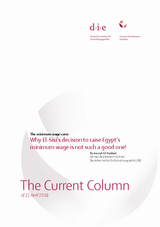The Current Column
The minimum wage curse
Why El-Sisi’s decision to raise Egypt’s minimum wage is not such a good one!
El-Haddad, AmirahThe Current Column (2019)
Bonn: German Development Institute / Deutsches Institut für Entwicklungspolitik (DIE), (The Current Column of 15 April 2019)
Bonn, 15 April 2019. Egypt’s President El-Sisi recently announced a 67 percent raise in the minimum wage to 2,000 Egyptian pounds (115.74 US-Dollar) per month from 1,200 (69.27 US-Dollar). He also promised state employees a wage raise of 7 percent plus a one-off 150 Egyptian pounds bonus. Sisi has offered the raises as reward for people’s endurance of austerity caused by reforms implemented in exchange for the International Monetary Fund’s 12 billion US-Dollar loan. Measures such as floating of the currency, sizeable cuts in subsidies and a range of new taxes have contributed to higher prices, hitting the poorest and the middle class the hardest. The wage increase may also be an attempt to ease people’s anger over the expected results of the referendum to allow the president to rule the country for at least 20 years. Whatever the reason, raising the minimum wage is not a good idea. The public sector minimum wage and wage increases will increase inequality not reduce it. With the reversal of Egypt’s state-led development strategy in 1991, public sector hiring was frozen in place. As a result, the public sector shrank by 16 percent from 1998 to 2012. But the formal private sector was only able to absorb 4 percent of those workers. So the majority of the middle-class workers retrenched from the public sector have migrated to the informal sector. Additionally, newcomers to the labour market generally have had to take the lowest paying jobs of that sector. Those informal jobs are low-skill, low-pay; concentrated in agriculture, construction, street vending and low value added services especially of rural migrants. As it is unregulated the informal sector does not adhere to the minimum wage. Indeed wages in the informal sector have been dramatically driven down by competitive pressures caused by the influx of labour which is no longer absorbed by the public sector. In result, sharp wage gaps have emerged at the tails of the wage distribution. These large wage gaps between the poorest and richest wage earners drive wage inequality. Increasing the minimum wage in the public sector and effecting wage raises will exacerbate the trend to greater inequality. Public sector wage raises are given in percentage terms. There have been numerous percentage wage increases through 2007-2012 as well as other haphazard wage raises in the wake of the 2011 uprisings in response to the loud voices of public sector employees. But since a percentage increase produces a larger absolute increase at the higher ends of the distribution, this means that the higher wage earners receive a higher wage increase compared to the low earners, introducing yet again another source of inequality. But the majority of Egypt’s labour-force works outside the formal sector, in turn 75 percent of these workers earn less than the minimum wage. So increasing the official minimum wage further only increases the wages of those who already earn more than about half the wage force, thus increasing inequality. There are a number of recommendations based on this analysis. First, the government could follow the example of the UK and subject public sector workers to a pay freeze or limit their pay rises to 1 percent per annum. Despite their relatively higher wages, public sector workers have also been crushed by the austerity measures. Thus, this solution involves a high risk of building social unrest. Another option is to formalize the informal sector to bring it within minimum wage legislation. Businesses will only take this step if the benefits outweigh costs. That will not be the case without a transformation of labour skills to support the higher wages of formality. This needs stronger educational underpinnings. Investing in education for the masses, rather than an arbitrary minimum wage for the labour aristocracy, is how to reduce inequality. There is a third option that would work better in the current Egyptian context.’ Sisi’s government could work on the “effective informal sector minimum wage” by implementing self-targeted public works programmes similar to those supported by the National Rural Employment Guarantee Act (NREGA) in India, which guarantees at least 100 days of waged work to every rural household with a guaranteed minimum wage for both men and women. If work is not provided within 15 days of application, applicants are entitled to unemployment allowance. Thus employment under the scheme is a legal entitlement. This program enhanced livelihood security in rural areas, built rural infrastructure (e.g. roads, canals, ponds and wells), protected the environment, reduced rural-urban migration (by creating rural employment), empowered women and closed the gender pay gap in rural areas. But most importantly, since the scheme became law, the informal sector has had to compete with this program for low-skilled labour, thus forcing the unregulated informal sector to increase its own “effective” wage rate. In the longer term, programmes like NREGA can reduce some of the wage inequality and partly eliminate the precariousness and instability of informal jobs. They may also assist informal labour in accumulating human capital, which will potentially enable wage progression, thereby breaking the current low skill-low wage trap inertia or the informality trap.


